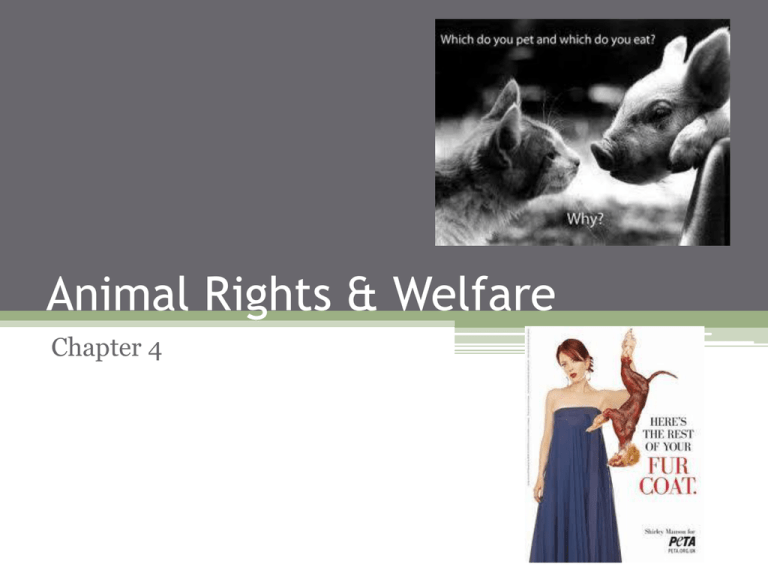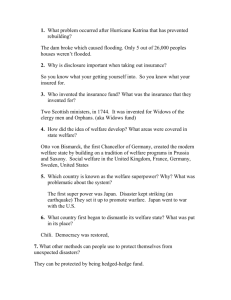Animal Rights & Welfare
advertisement

Animal Rights & Welfare Chapter 4 Terms • Animal Rights ▫ The position that animals should not be exploited • Animal Welfare ▫ The position that animals should be treated humanely • Confinement Systems ▫ Animals are confined to cages or pens in partially enclosed or totally enclosed buildings so that production improves through closer control of the environment Terms • Ecoterrorism ▫ Terrorism or crimes committed under the disguise of saving nature • Factory Farming ▫ Practice of keeping chickens in cages and veal calves in small crates • Humanize ▫ To believe that animals have the same rights as humans and to treat them as humans Terms • Intensive Operations ▫ Farming operations in which the farmer or manager tries to increase output through better breeding, feeding and management • Specieism ▫ Belief that any use of animals by humans reflects a bias or that humans are superior to animals • Unethical ▫ A belief that something is going against one’s moral principles and values Terms • Vivisection ▫ Research consisting of surgical operations and experiments to study the structure and function of organs. Current Topics In Animal Rights & Welfare • • • • • • • • • • • Animals as Property Scientific testing Animal Agriculture Caged Animals Entertainment Animals Veganism Factory Farming Fish & Fishing Vivisection Hunting Use of furs Check It Out! • Animal rights vs Animal welfare has a long history • Pgs 32-34 1641 • First laws to protect farm animals • “The Body of Liberties” • Massachusetts bay colony 1828 • First anticruelty lab passed by New York • “Each person who shall maliciously kill, main, or wound any horse, ox, or other cattle, or sheep, belonging to another, or shall maliciously and cruelly beat or torture such animal whether belonging to himself or another, shall upon conviction, be adjudged guilty of a misdemeanor.” 1866 • American Society for the Prevention of Cruelty to Animals (ASPCA) • Formed for welfare of disabled horses • America’s first humane society • Founded by Henry Bergh 1867 • “An Act for the more effectual prevention of cruelty to animals.” • Ten sections • 41 states and DC have laws based on it 1906 • Animal Transportation Act ▫ Protect animals traveling long distances by rail • 95% of animals today are transported by truck ▫ Law was never amended to include them 1958 • Humane Slaughter Act • Amended in 1970s to include handling prior to slaughter 1964 • Ruth Harrison ▫ Animal Machines: The New Factory Farming Industry • Focused on the use of antibiotics & hormones • Investigation led to laws concerning treatment: ▫ ▫ ▫ ▫ ▫ ▫ Chickens Turkeys Pigs Cattle Sheep Rabbits 1966 • Public Law 89-544 (AWA) • Laboratory Animal Welfare Act • Regulated dealers who handled research: ▫ ▫ ▫ ▫ ▫ ▫ Dogs Cats Hamsters Guinea Pigs Rabbits Primates • First amendment authorized regulation of other warm bloods 1970 • Horse Protection Act • Regulates show business • Specific to gait alteration 1970s • • • • It all began… Modern Animal Rights Movement Urban vegetarians Draws activists from philosophy, theology, and human rights 1970s • Peter Singer ▫ Animal Liberation • Founder of modern animal rights movement • Book condemned use of animals in food and research 1976 • Amendment to AWA prohibited animal fighting • Regulated commercial transport 1985 • Improved Standards for Laboratory Animals Act ▫ Issued additional standards for research animals ▫ Standards for dog exercise ▫ Physical environment standards • Institutional Animal Care & Use Committees ▫ Minimal pain and distress ▫ Anesthetics, analgesics & tranquilizer use ▫ Consider alternative to painful procedures 1986 • Animal Liberation Front • $$$$$ of damage at Oregon State • Set fires at University of California-Davis • Independence day attack at Texas Tech 1989 • Farm Animal and Research Facilities Protection Act • Applied to premise where animals are kept for: ▫ ▫ ▫ ▫ Food Ag Research Testing Education • Federal crime to disrupt activities • $10,000 fine • Passed in August 1992 1990 • “March for the Animals” • 15-24,000 people 1990 • Food, Agriculture, Conservation and Trade Act ▫ Pet protection provisions • Covers 4 institution categories ▫ ▫ ▫ ▫ Dogs & Cat breeders Zoos Circuses Research Facilities 1992 • Animal Enterprise Protection Act • Protects: ▫ ▫ ▫ ▫ ▫ ▫ ▫ ▫ Zoos Aquariums Circuses Rodeos Fairs Auctions Packing Plants Commercial & Academic Enterprises 1997 • Ecoterrorism • 10,000 mink released from a fur ranch • ½ the animals died in fighting each other • 1,300 of the animals recaptured would die later Do Animals Have Rights? • Animal Rights ▫ ▫ ▫ ▫ Same as humans Specieism Feel pain Humans are animals • Animal Welfare • Humanely without cruelty • Should receive proper care • Can be used in research when alternatives are unavailable Should animals be used for food? • Animal Rights ▫ ▫ ▫ ▫ Inhumane Meat is unhealthy Constant housing Physiological and behavioral problem ▫ Large corporations who care about profits • Animal Welfare • Best interest of farmers to care for animals • Intensive operations • Confinement systems • Protection from the elements • 97% of farms are family owned Should animals be used in experiments? • Animal Rights ▫ ▫ ▫ ▫ Unethical Unnecessary Exaggerated value Misleading tests could danger human health ▫ Pound seizures, Draize Testing, * Classical LD50 ▫ 6 million animals used in experimentation • Animal Welfare • Biomedical research limited or stopped • Organ transplants • # of animals used is declining • 90% are rats/mice • Bovine Corneal Opacity Test • Plastic models • Tissue Culture Does the type of animal used matter? • • • • Monkeys vs Mice? Dogs vs Rats? Why? Does it matter what test is being conducted? Should hunting and trapping be allowed? • Animal Rights ▫ ▫ ▫ ▫ ▫ Inhumane Unnatural “Joy of killing” Stop use of dogs “Regulations = providing animals to hunt” ▫ Hunting food is not necessary • Animal Welfare • Prime source of $$ for preserving wildlife • Tradition • Population control • Focus public attn on wildlife • Initiates of wildlife laws • Harvest only surplus animals Some Odds and Ends • USDA implements regulation of most animal welfare laws • Charles Stenholm & Senator Howell Heflin cosponsored the Animal Enterprise Protection Act of 1992 • Rabbits are used in the Draize Eye Test because they don’t have tear ducts • Approximately 1 million animals are used in ed facilities for dissection annually Odds and Ends • The LD50 test determines the dose required to kill 50% of a test population • Primates make up about ½ of 1% of experiment animals • Crushed monkey spinal cords were necessary to make the polio vaccine









